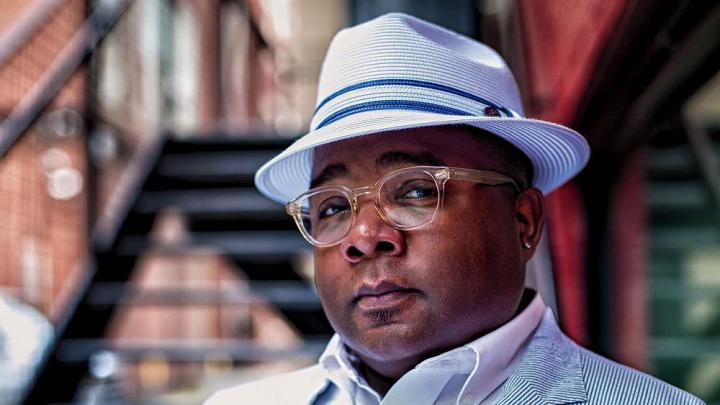One morning in the spring of 2015, the composer Jonathan Bailey Holland, Ph.D. ’00, was riding the bus to Boston’s Berklee College of Music (now the Boston Conservatory at Berklee, where he’s chair of composition, contemporary music, and core studies). He had recently been commissioned to write a new work for the Radius Ensemble, a local chamber group, and ideas for the piece tumbled through his mind. Also weighing heavily on him was the crescendo of news stories about police brutality against African Americans. Holland had challenged himself to watch the bystander and dash-cam videos of some of these events in their entirety. Bent over his phone, playing footage of Eric Garner’s last moments on a Staten Island sidewalk, Holland eventually had to stop and look up. “The visceral quality of it…,” he recalls. “It’s difficult to take in.”
With each repeat view and each new tragedy in the headlines, he felt increasingly entangled. “Simply because of who I am and what I look like, I could easily be on the other side of these stories,” he continues. “Suddenly the music couldn’t be about anything but that psychological space.”
The resulting work, “Synchrony,” explores the idea of duality, or two realities existing at once—for example, the Black Lives Matter movement taking shape during the country’s first black presidency, when “the notion of a post-racial America was thrown around,” says Holland. The score is written for violin, cello, oboe, bassoon, and piano—an unusual combination but beautiful in its symmetry, says Jennifer Montbach ’95, Radius Ensemble’s artistic director. “There are two stringed instruments and two double reeds. Plus, with the similar ranges of oboe and violin, cello and bassoon, you have two pairs of instruments that cover an entire timbral range, top to bottom. Piano is the anchor.” The piece opens with the gentle tonal sounds of the double reeds, and the music builds almost ceremonially as the others join in. Throughout, Holland expresses duality through musical devices: call and response, repetition, dissonance, instrumentation, and so-called “extended techniques”—unconventional ways of using an instrument.
Holland decided to add documentary voices to underscore the idea of juxtaposition—of hope and despair, harmony and discord. About two minutes in, President Obama’s voice intones over the music, “We, the people, still believe that every citizen deserves a basic measure of security and dignity.” From there the score becomes fraught with tension, and Eric Garner is heard repeating “I can’t breathe” through the chokehold of a New York City police officer. “There’s a very specific rhythm to how he says it, so I had the musicians pick up on the rhythm, which they keep up even after the audio clip ends,” Holland explains. The oboist and bassoonist remove their reeds and breathe into their instruments in that same pattern; the pianist reaches into the instrument to dampen the strings, hammering out the rhythm to produce a dull, percussive sound without pitch. These extended techniques create a sound that’s both percussive and breathy, like the wheeze and punch patterns of a hospital respirator.
Then comes a second set of voices. First, actress Cicely Tyson is heard addressing the young women in the audience of the Black Girls Rock awards ceremony: “The moment anyone tries to demean or degrade you in any way, you have to know how great you are. No one is going to bother to put you down if you are not a threat to them.” Her words are countered by audio from the dash-cam footage of the arrest of Sandra Bland. The instruments respond with gnashing sounds, and the piece ultimately closes in a decrescendo of dissonant whole notes. This unresolved conclusion represents Holland’s view of the national conversation about race.
Reacting to the world around him in this way is one of the artist’s responsibilities, he says, but it’s also impossible for him not to. “Dream Elegy,” a somber orchestral piece that he wrote around the same time as “Synchrony,” came from a similar psychological space, sparked by the senseless deaths of Tamir Rice and Michael Brown. “I had to write [it] as a meditation,” he says, “as a way of using my art to work through the weight of all of those events.”
Holland, who grew up in Flint, Michigan, and earned his bachelor’s at the Curtis Institute of Music and his Harvard doctorate in composition, didn’t take this approach from the outset. Early in his career, he had hang-ups about “who I was supposed to be as a classical composer,” he says. “I didn’t want people to expect a certain kind of music because I’m a black composer, I wanted people to come to my music without any preconceived ideas about what the music was going to be.” At some point, he stopped worrying about how to manage audience perceptions. Soon after this realization, he completed a 2003 commission for the Detroit Symphony Orchestra, influenced by Motown, R&B, soul, and other popular music genres he’d always listened to. It was, he thinks, the first time he consciously decided to let that side of him come out clearly in his music. He wrote what felt true.
Today, Holland tries to convey the same message to his composition students: “If I’m not telling you who I am in a genuine way, I’m not sure why you’d want to listen to what I have to say,” he reasons. Without that, he says, “Who cares what I’m writing?”








